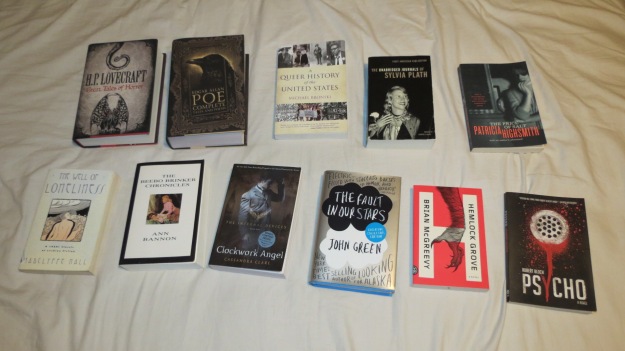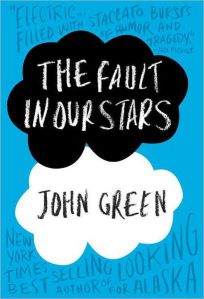 Even though my birthday was on the twenty-third of April, all the books I ordered just now came in. I received the emotionally distant present of a giftcard (which I fucking love) was excited to take advantage of all that free money. What did I do? I ordered books, of course.
Even though my birthday was on the twenty-third of April, all the books I ordered just now came in. I received the emotionally distant present of a giftcard (which I fucking love) was excited to take advantage of all that free money. What did I do? I ordered books, of course.
1. H.P. Lovecraft: Great Tales of Horror
I have a problem: I’m a colossal, raging bibliophile. If I already own a book but see a nicer looking cover later on, you bet your ass I’m going to buy it. This book is no exception. I own Necronomicon too, but my reasoning for buying this one as well was, “THIS HAS AN ADORABLE CTHULHU ON THE COVER.” Logic is clearly my best trait.
2. Edgar Allan Poe: Complete Tales and Poems
Back in eighth grade, I lent a copy of my complete works of Edgar Allen Poe to some atrocious person I thought was my friend, only to have a falling out and never get it back. Well, the joke’s on her because I bought another one with an even cooler cover six years later. Take that, adolescence.
3. A Queer History of the United States by Michael Bronski
“A text book? Really?” Yes, really. This particular one is for novel research purposes only. Also, I found an appalling lack of queer history on the internet.
4. The Unabridged Journals of Sylvia Plath
Oh, Sylvia. Sweet, wonderful Sylvia. I adore her and everything she was. Reading The Bell Jar last year aided me in so many ways. I’ve never experienced a writer who could channel all of my confusion and sorrow and listlessness into words so accurately, even though we’re generations apart. So, clearly, I had to buy her journals to consume the musings of my 1960s self.
5. The Price of Salt by Patricia Highsmith (also under the name Claire Morgan)
It is said that Vladimir Nabokov was so inspired by this particular book that he wrote Lolita. Like, woah, man. That should be sick (but awesome) enough to make anyone want to buy this book.
6. The Well of Loneliness by Radclyffe Hall
More gay. That’s it, really.
7. The Beebo Brinker Chronicles by Ann Bannon.
EVEN MORE GAY! No, seriously, this one is for personal educational/research purposes as well. I’m in dire needs of information about queer culture in the sixties.
8. Clockwork Angel by Cassandra Clare
I’m going to be honest, I’ve heard a lot of nasty tales about Cassandra Clare and what she once did in the Harry Potter fandom. However, I decided to let that minor detail slide and check out her Infernal Devices series, which looks way more interesting than The Mortal Instruments even though they’re closely linked together.
9. The Fault in Our Stars by John Green
I wanted to see what all the hype was about and why all these teenage girls kept saying, “Okay.” Find my review of the book here.
10. Hemlock Grove by Brian McGreevy
After seeing Netflix make it into a show, I had to buy the book because that’s how I roll. Plus, it has werewolves.
11. Psycho by Robert Bloch
Apparently, while making his rule-breaking classic film, Alfred Hitchcock bought as many copies of this book as he could so the plot to his movie wouldn’t be ruined. Being a fan of both the movie Psycho and Hitchcock as a person, this novel was on my priority list.


